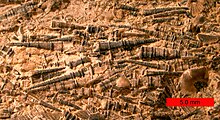| Tentaculita Temporal range: Early Ordovician to Middle Jurassic (Vinn 2010)
| |
|---|---|

| |
| Tentaculitids from the Devonian of Maryland. | |
| Scientific classification | |
| Domain: | Eukaryota |
| Kingdom: | Animalia |
| Clade: | Lophophorata |
| Class: | †Tentaculita Boucek, 1964 |
| Taxa of uncertain placement | |
Tentaculita is an extinct class of lophophorates ranging from the Early Ordovician to the Middle Jurassic. They were suspension feeders with a near worldwide distribution. For a more thorough discussion, see Tentaculites.
The presence of perforate septa and "septal necks" has been used to argue for a cephalopod affinity, whereas the shell microstructure, notably the presence of punctae, points to a brachiopod relationship,[5] and preserved musculature suggests a relationship with bryozoans.[6]
- ^ O. Vinn, M. Isakar (2007). "The tentaculitid affinities of Anticalyptraea from the Silurian of Baltoscandia". Palaeontology. 50: 1385–1390. doi:10.1111/j.1475-4983.2007.00715.x.
- ^ a b N. M. Farsan. 1994. Tentaculiten: Ontogenese, Systematik, Phylogenese, Biostratonomie und Morphologie 547:1-128
- ^ O. Vinn, M.-A. Motus (2008). "The earliest endosymbiotic mineralized tubeworms from the Silurian of Podolia, Ukraine". Journal of Paleontology. 82 (2). doi:10.1666/07-056.1.
- ^ M. Zatoń, H. Hagdorn, T. Borszcz (2013). "Microconchids of the species Microconchus valvatus (Münster in Goldfuss, 1831) from the Upper Muschelkalk (Middle Triassic) of Germany". Palaeobiodiversity and Palaeoenvironments. 94 (3). doi:10.1007/s12549-013-0128-6.
{{cite journal}}: CS1 maint: multiple names: authors list (link) - ^ Weedon, Michael J. (1990). "Shell structure and affinity of vermiform 'gastropods'". Lethaia. 23 (3): 297–309. doi:10.1111/j.1502-3931.1990.tb01455.x.
- ^ Vinn, Olev; Hambardzumyan, Tamara; Temereva, Elena; Grigoryan, Arayik; Tsatryan, Meline; Harutyunyan, Lusine; Asatryan, Karine; Serobyan, Vahram (2024). "Fossilized soft tissues in tentaculitids from the Upper Devonian of Armenia: Towards solving the mystery of their phylogenetic affinities". Palaeoworld. doi:10.1016/j.palwor.2024.10.004.